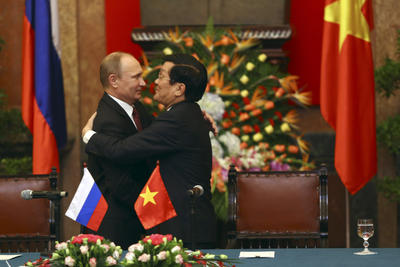The intensity of high-profile diplomatic activity seems to confirm this. Since July 2012, the two countries’ presidents have met each other no less than four times, while Prime Ministers Dmitry Medvedev and Nguyen Tan Dung have also exchanged visits.
Against this background, bilateral trade statistics look rather modest: according to Russian sources bilateral trade turnover, although increasing by 20 per cent in 2012, reached only US$3.6 billion — a level much lower than Vietnam’s trade with partners such as China and the United States. Even if, according to official projections (and as a result of a free trade agreement currently under negotiation between Vietnam and the countries of the customs union of Russia, Byelorussia and Kazakhstan), trade rises to US$7 billion in 2015 and US$10 billion in 2020, Russia will still be well behind Vietnam’s biggest trade partners.
One may wonder why Vietnam, famous for its pragmatism, is approaching Russia with such a positive attitude. From Vietnam’s point of view, what is so attractive and promising about this partner?
In the Vietnamese psyche Russia is not associated with any kind of existential threat — economic or military. Unlike some other great powers, Russia carries no responsibility for the tragedies of Indochina wars. On the contrary, through Vietnam’s decades of turmoil the USSR proved to be a tested (and generous) friend — including during the Cambodian–Vietnamese War. Much of the positive chemistry between the Russians and the Vietnamese was generated back then, and this mutual sympathy remains a major ingredient in the relationship.
Since so many Vietnamese not just operated Soviet/Russian military equipment but also studied in the Soviet Union/Russia, they are more aware of Russia’s soft power too — its educational, technological, scientific and cultural richness — which has influenced positive attitudes to Russia among Vietnamese.
While much of the world remains skeptical about Russia’s business climate, there are examples of Vietnamese who were educated in Russia and raised considerable fortunes there before making it big at home. One famous case is that of Pham Nhat Vuong: the first tycoon of modern Vietnam to enter the Forbes list of the world’s richest people, worth an estimated US$1.5 billion.
Looking at the set of agreements and memorandums signed during Putin’s latest visit, one will note that it covers a rather wide range of subjects. These include a series of joint ventures and huge projects in the field of hydrocarbon energy, construction of the first nuclear power plant in Indochina, educational and innovative initiatives, and healthcare. A new agreement on military cooperation is also included, and the package looks like a foundation on which the partners intend to construct a more diversified system of linkages.
Judging by the joint statement on the talks, there was quite a substantial discussion on issues of regional and global importance. Along with the new architecture for regional security and cooperation, issues as sensitive as Syria and the South China Sea were also discussed. Consistent with previous negotiations, the leaders of Russia and Vietnam stated that all territorial disputes in the Asia Pacific should be settled only by peaceful means, without the use or the threat of force, in accordance with the UN Charter and UNCLOS 1982. The strong support of a political and diplomatic solution to the Syrian crisis by both presidents was quite predictable, as was their common appreciation of ASEAN’s centrality in the emerging regional architecture.
If ‘comprehensive strategic partnership’ stands for a relationship with deep historical roots, and growing closeness built on similar regional and global perceptions, then the Russia-Vietnam partnership deserves this definition.
Dr Victor Sumsky is Director of the ASEAN Centre at MGIMO University, Moscow.


Vietnam is a country where political expressions are high risk, low reward business, so the national body language is the crucial reading beyond government announcements and joint declarations.
The US-Vietnam elevated relation also was written up as ” comprehensive strategic partnership ” but the tone was subdued, mass media coverage was measured and popular reactions were non-existent. A week before Mr. Putin’s visit, Vietnam had to roll out the carpet for the Chinese PM Li: children also waved flags and dignitaries lined up, 17 agreements were issued for routine publication and agreeable commentaries. Some strong objections to the government’s premature removal of mourning half-flags for the passing national hero General Vo Nguyen Giap in favor of the cheerful full flags greeting Chinese leader.
Mr. Putin’s arrival was different and full of energy: government officials appeared happy, the press did not wait for official props to produce long and positive opinions along with visibly contented population. This contrasting picture showed the real pulse of the country:
. Complete distrust of Chinese peaceful approaches and lack of strategic belief in possible progress between officials of the 2 neighbors.
. Suspicion of any real gains with the calculating US government both politically and economically. Superpower gaming between the US and China which can result Vietnam’s sovereignty losses were mentioned.
. Even visiting Japanese PM Abe, and India-Vietnam enhanced relations received more enthusiasm, hope and expectations… than the Presidents Sang-Obama’s DC summit.
Anti-China or fear of Chinese aggression dominate the government and population of Vietnam. It inflated Mr. Putin’s warm welcome. It inserts doubt of more US hurt and loss of land/island. It magnifies US$ 100 million Indian military aid as the national defense zone. It makes once war crimes committing Japan (whose imperial army starved to death 1 million Vietnamese) turn into an economic and military trump card against the next Chinese move.
So much international maneuverings and domestic gymnastics for a country that just happens to be located next to China, wishing to be left alone.